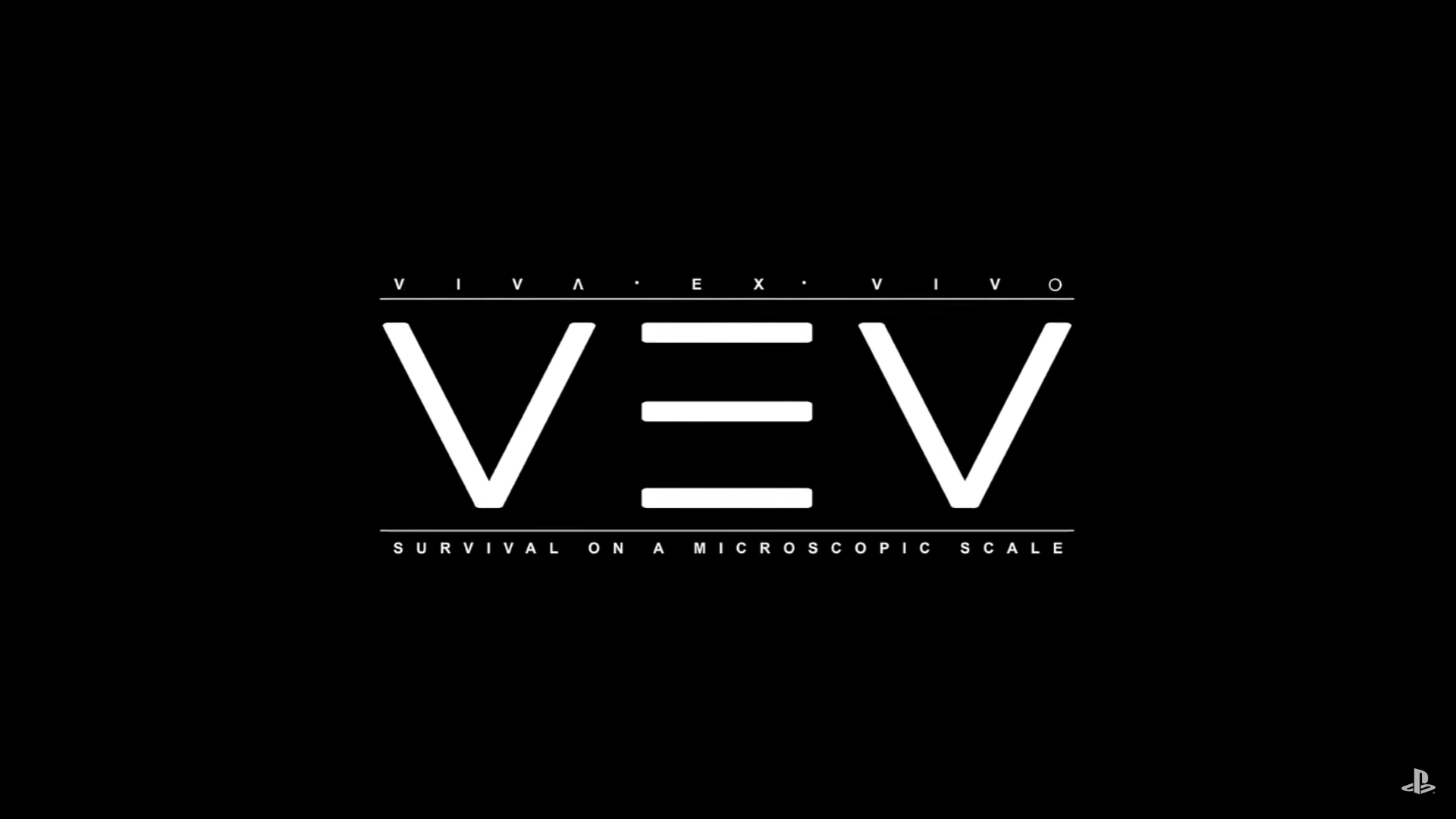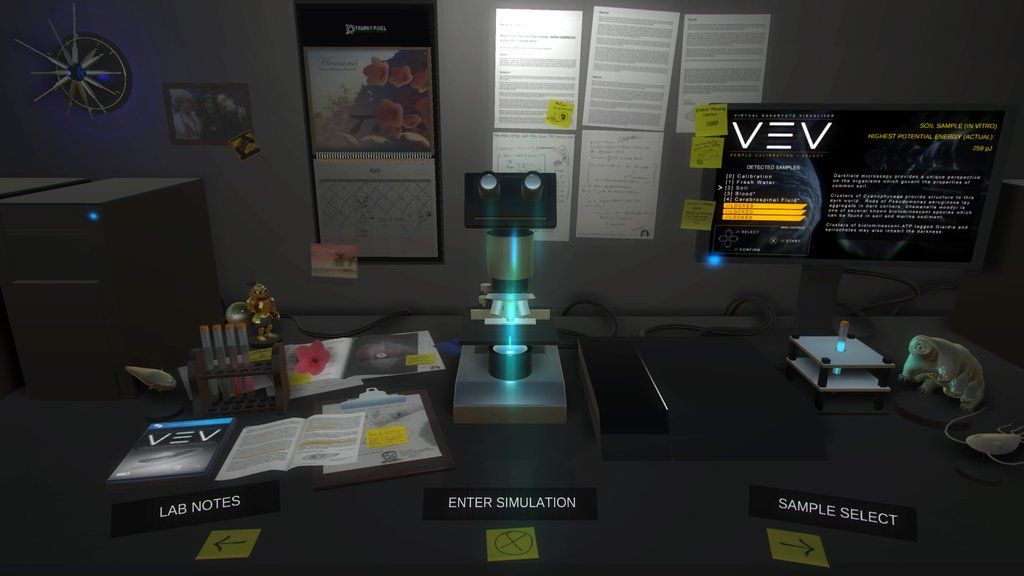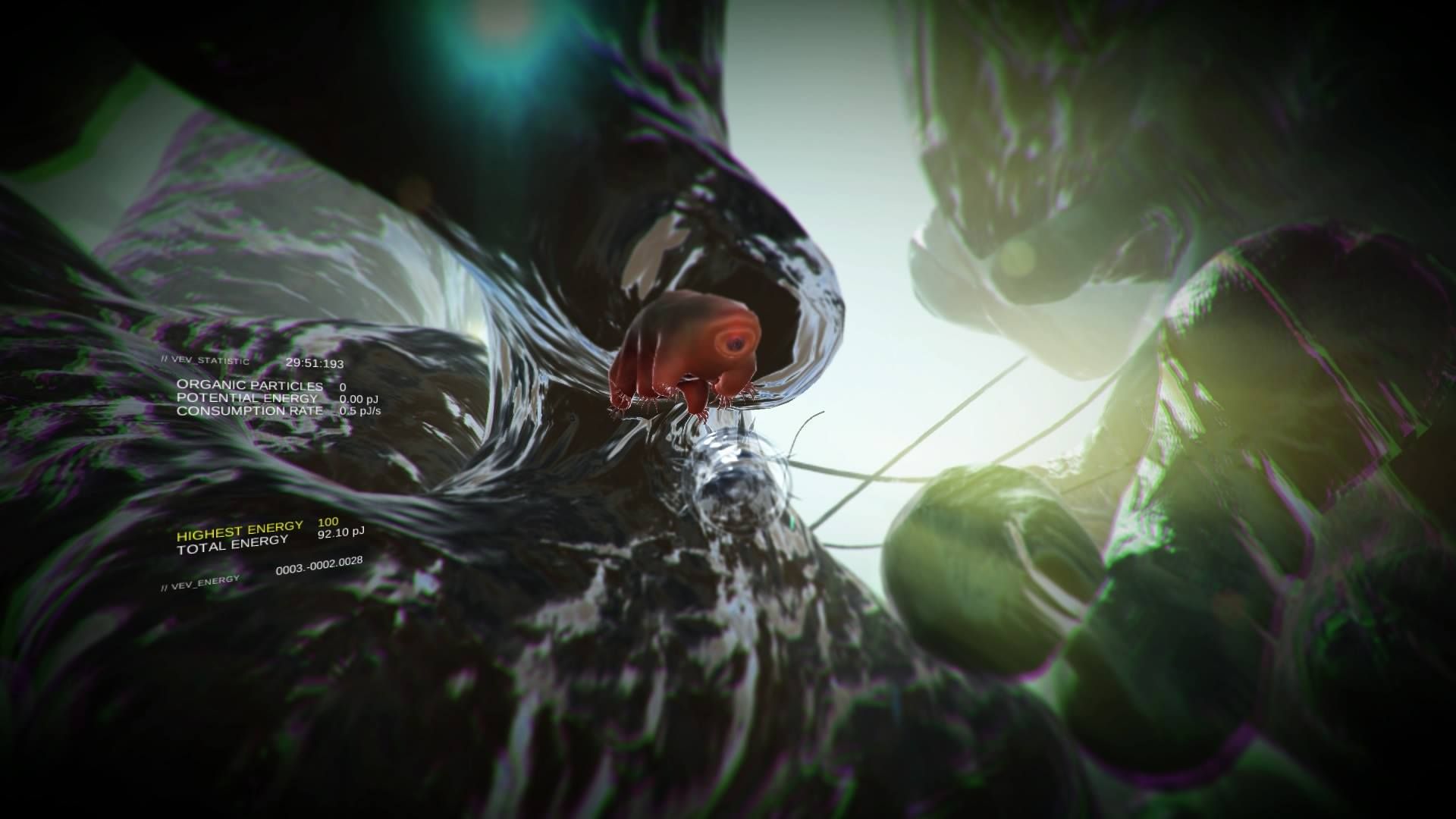Truant Pixel's first game -- VEV: Viva Ex Vivo -- makes for a lukewarm tech demo that truly plays to the developer's high points. The studio, known for their work making dynamic themes for the PlayStation 4, delivers on some breathtaking visuals and environments. Sadly, those locales are marred by poor game design, leading to a game that makes for a pretty experience, but not much else.
The premise of VEV is admittedly interesting -- working in a laboratory, your team has discovered and created a Virtual Eukaryote Visualizer ("VEV") to explore microscopic environments in never-before-seen detail. As the scientist, you are asked to pilot these VEV drones to see the maximum amount of energy that can be held in a single sessions.
Players collect potential energy by finding and absorbing tiny, floating organic compounds in the simulation. Every movement you take will deplete a set amount of energy and other micro organisms are floating around looking to poach your own energy -- making the game partly resource management, partly survival.
While that pitch sounds legitimately interesting, especially for those with acute interests in science, the game is hardly as fun in practice. This is largely the blame of some very poor game design choices. For one, each session in every sample (from blood to the extraordinarily simple tutorial) lasts 30 minutes. And if 30 minutes sounds like a long time, it feels even longer in practice. Without diverse objectives -- or for that matter, a satisfyingly primary objective -- the game feels like a sightseeing tour where you have to juggle the occasional poor resource management.
Not only that, but in order to collect the nutrients, players have to ram their drones directly into them. While other games would have implemented some sort of draw or magnetic mechanic to bring the nutrients closer to the VEV drones, the game forces players often to make constant U-turns in an effort to collect particles. Though this a curve that players can become more experienced with after longer play sessions, the result is always frustrating.
Unfortunately, it isn't solely the game's mechanics that drag the game down. Nothing in the title feels particularly rewarding. I'm unsure whether they were leaning on the trophies being the sole metric of accomplishment, but absent leaderboard and given the simplistic aesthetic VEV feels rather pointless -- especially for a game which boasts arcade-style gameplay.
Nearly half the levels (3 of 7 total levels) remain locked in the beginning, with barely any explanation on how to access them. While the unlocked stages let you explore microscopic, biological environments, the locked stages are far more surreal -- giving you options like space or the outdoors. These different locations are just as beautiful as the rest of the environments, but it is unclear on how to access them.
The controls are unobjectionable at best. Most everything controls smoothly, but there is no flair to navigation. This doesn't include the caveat where players the VEV drone hits an object, which results in an unfortunate camera quake as players struggle to reign in the controls. There is a dedicated button to do so, but it is unclear whether this is a feature or the game or a quick workaround to a coding problem.
The largest problem that will likely result in negative scores (and the hefty weight given to the above factors) is the current advertising and pitch of the game. In Truant Pixel's own PlayStation Blog post, the developer has described VEV: Viva Ex Vivo as an "arcade-style survival" game. And -- if you take that as true -- VEV would be incredibly sub-par, with bland objectives and uninteresting gameplay.
However, when taking this game as more of an experience/exploration title, the result is quite good. Though the environments are somewhat limited, they are all interesting and visually striking. The result is similar to if experimental title Everybody's Gone to the Rapture labelled itself a "First-Person Shooter" -- the standards by which to judge the game are fundamentally different, in comparison.
That said, even if VEV adopted this new genre, there are still some obvious additions that would enhance the experience. Notably, VEV would have been better served by having a Free Play or exploration mode where players would be allowed to free roam with their VEV drone without worrying about collecting and managing nutrients.
With all the major negatives out of the way, there are some distinct positives about the game worth noting. The visuals are terrific, allowing players to explore and navigate surreal environments that seem to be at once instantly familiar to those acclimated with biology. In fact, I often lost interest in the main objectives completely and would go off exploring blood cells and food particles in the randomly generated environments.
Another positive is the game will be PlayStation VR compatible for free to all purchasers following PSVR's launch. And while I wasn't completely sold on the experience on my TV screen, I can see the gameplay becoming far more meditative and surreal when playing in virtual reality. In many ways, the game seems to be designed for virtual reality, feeling somewhat out of place on the TV when placed in competition with other more satisfying arcade shooters. It will also give Truant Pixel the option of addressing some of the larger issues plaguing the game, especially those that hinder exploration.
With that mentioned, the score above reflects VEV as it currently exists now (as an arcade-style survival title) on PlayStation 4 -- the game feels like it was created for virtual reality, and it frankly suffers being released prior to that experience. I look forward to returning to this review months from now, and being able to give a VR update.
Even with the $5 asking price in North America, I'm hesitant to recommend VEV: Viva Ex Vivo to most. The game can be "beaten" in exactly two hours, and the gameplay felt stale before I had even played 30 minutes. With all that said, the game should be on the shortlist for any prospective PlayStation VR owners. Given the absurdly affordable price and diverse visual environments, VEV already feels more at home as a visual "experience" game than its marketed "arcade shooter" genre.





